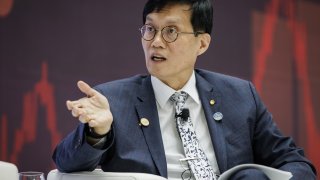
- Governor Rhee Chang-yong told CNBC that external factors are fueling the Korean won's weakness including the recent appreciation of the U.S. dollar.
- "I think the recent movement is a little bit excessive judging from what we could be justified by market fundamentals," he told CNBC's Karen Tso on the sidelines of the IMF Spring meetings in Washington on Tuesday.
- Rhee said the central bank is ready to "deploy stabilizing measures" if the market volatility continues and has enough resources to do so.
The Bank of Korea will intervene to control currency volatility if needed, the central bank's chief told CNBC, describing the recent market fluctuations as a little "excessive."
Central bank governor Rhee Chang-yong said external factors are fueling the Korean won's movement.
Get San Diego local news, weather forecasts, sports and lifestyle stories to your inbox. Sign up for NBC San Diego newsletters.
"I think the recent movement is a little bit excessive judging from what we could be justified by market fundamentals," he told CNBC's Karen Tso on the sidelines of the IMF Spring meetings in Washington on Tuesday.
Rhee attributed the won's weakness to the strength of the U.S. dollar as well as geopolitical tensions in the Middle East. Weakness in other Asian currencies like the Japanese yen and Chinese yuan are also affecting the won, he added.
The won strengthened on Wednesday to as high as 1,382.6 per dollar, up 1.26% after hitting a 17-month low and breaching a major threshold of 1,400 per dollar on Tuesday.
Money Report
Stabilizing measures
Rhee said the central bank is ready to "deploy stabilizing measures" if the market volatility continues and has enough resources to do so.
"I do not mean that we will heavily intervene every movement. But I think basically, we can deploy FX intervention," he said, adding that the country has "other domestic agencies" and "many tools" they can deploy.
His comments came as South Korea's Finance Minister Choi Sang-mok met with his Japanese counterpart Shunichi Suzuki on the sidelines of the G20 Finance Ministers and Central Bank Governors Meeting in Washington D.C.
"Regarding foreign exchange market developments, the two ministers shared serious concerns about the recent significant depreciation of the Japanese yen and the Korean won, and expressed their intention to take appropriate actions against excessive movements," South Korea's Ministry of Economy and Finance said in a statement.
Sticky inflation
The Bank of Korea kept its benchmark interest rate unchanged at 3.5% on Friday.
Rhee highlighted that inflation challenges remain.
"I think our problem is that, unlike the U.S. and Europe, our headline inflation is higher than core inflation. And core inflation is moderating as expected, but headline inflation is quite sticky at this moment," he told CNBC.
He added that the central bank won't be ready to move on interest rates until "we can be confident" that inflation will converge to the target level.






